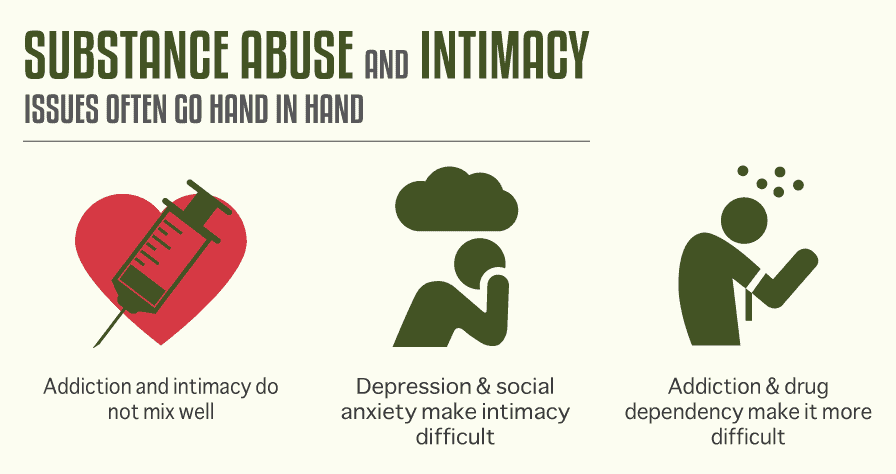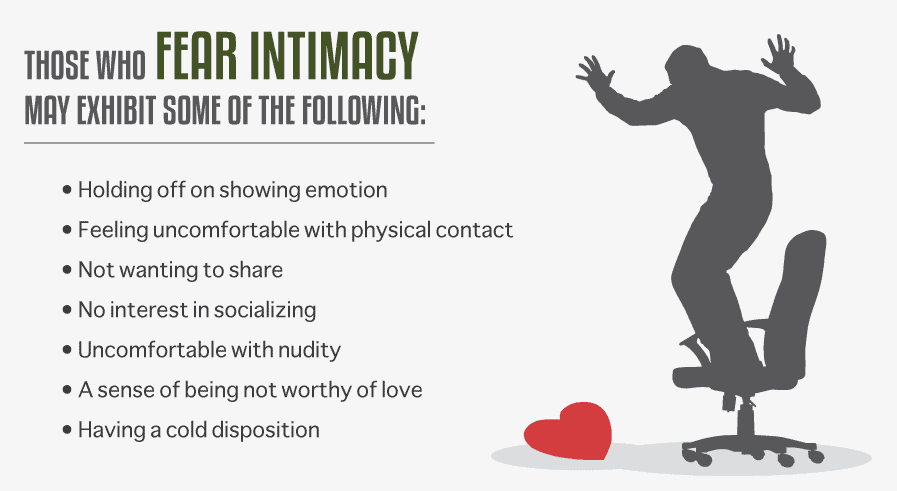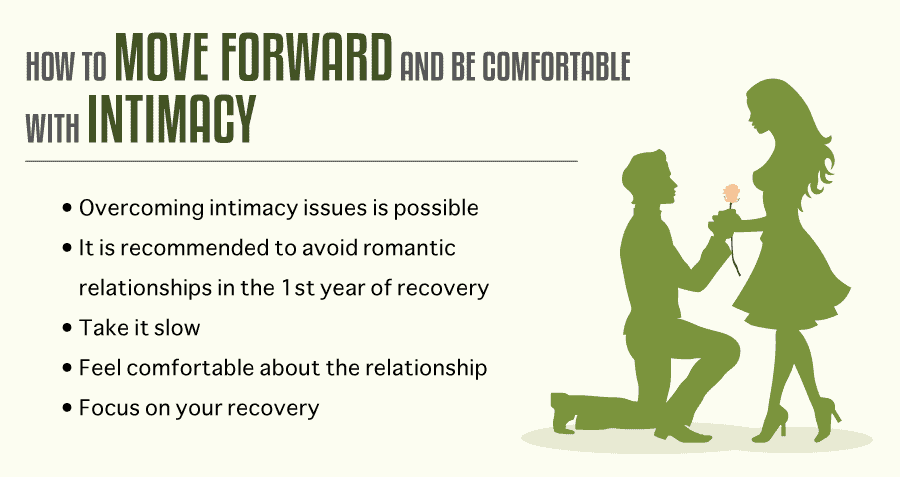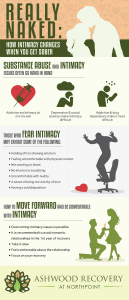It does not come as much of a surprise that recovering addicts are often faced with the added challenge of recovering their relationships, particularly during the early stages of recovery. Reinvigorating and learning to grow healthy levels of intimacy is an integral part of addiction recovery. Since substance abuse (like alcoholism and drug addiction) are often associated with secrecy, isolation, and social distancing, recovering alcoholics and addicts often start from ground zero when it comes to rebuilding the most important relationships in their lives. Intimacy, in this way, does not simply mean sexual or romantic relationships – it means rebuilding trust and cohesion with everyone closest to you, from your family members to your sponsor.
“Our rehab program provides family therapy. Many health insurance plans accepted. Here’s our program.”
That said, recovering addicts often experience issues in sexual and romantic intimacy as a result of the hang-ups from the time before they were sober. Thankfully, it is not impossible to overcome these difficulties. It is not an easy process, but it is crucial to continuing on the path to recovery. Beginning the journey toward renewed intimacy requires understanding how addiction is tied to issues of intimacy, as well as a healthy point of view on what intimacy can look like in sobriety – particularly in the early stages. Knowing the underlying issues that fuel not only addiction but problems with intimacy, is the first step toward recovering and rebuilding the intimacy that you once had with others.
Substance Abuse and Intimacy Issues Often Go Hand in Hand
There is no question that addiction and intimacy do not mix well. More often than not, alcoholics and addicts experience their addiction issues as a result of other factors that lead to intimacy issues (such as personality challenges, psychological disorders, or even unresolved childhood trauma). If depression and social anxiety make intimacy difficult, addiction, alcoholism and drug dependency only make the issue worse. This kind of codependency of addiction and intimacy issues make it difficult to separate the two on the path to recovery, and it is crucial to treat both equally and even simultaneously. Robert Weiss, a Licensed Clinical Social Worker, makes this connection clear: “It is readily apparent to me that in this type of paired addiction the drug use and current/past/future fears and challenges related to intimacy and adult sexuality must be treated in concert, rather than simply making an assumption that getting the client chemically sober will also clear up the intimacy issues. The simple fact is that only by recognizing the full nature of an addict’s impulsive, compulsive, and addictive behaviors – including sex, relationship, and intimacy elements – can clinicians construct and implement treatment regimens that completely rather than partially meet the needs.” Clearly, it is next to impossible for individuals who abuse alcohol or drugs to keep up healthy relationships, either with new acquaintances or with loved ones. Since the road to recovery requires a renewed dedication to sobriety, it also requires a commitment to recovering the intimate potential of relationships. Of course, the level of intimacy varies person-to-person and relationship-to-relationship. However, there are several hallmarks of an intimate relationship that everyone should look for:
- An expectation of a continued, long-term relationship
- The tendency to think of ‘us’ rather than ‘me’
- An expectation of fair treatment
- Expressed affection, love, and care for one another
- Extensive knowledge of the other person in the relationship
- Trust
A Fear of Intimacy Can Get in the Way of Full Recovery
One of the major hang-ups for individuals on the road to recovery is an innate fear of intimacy. This is not necessarily caused by a fear of intimacy itself, but rather what intimacy can bring – including the perceived danger of the relationship and the potential of either being hurt or hurting others. It is this fear of the outcome of intimacy that leads recovering alcoholics to avoid intimacy altogether. Individuals with a fear of intimacy may certainly value love and intimacy, but are attempting to protect themselves or others by keeping at a distance. This applies to both emotional and physical intimacy, and is only compounded when the two converge. A range of personal, psychological and emotional factors can cause the fear of intimacy for recovering addicts. Some recovering addicts may have experienced physical or psychological abuse as a child, while others take issue with their physical appearance. Some have issues of low self-esteem, which extends into areas of intimacy. Others may have a bitter romantic experience in the past, which may lead them to fear intimacy in the future. Fear of intimacy is also a symptom of depression, which is highly correlated with substance abuse and alcoholism. Whatever the cause, the fear of intimacy has the same symptoms, which can be recognized both by the individual and by others around them. Those with a fear of intimacy may exhibit some of the following:
- Hesitancy to share and process emotions
- Showing discomfort at physical contact (even a hug from a family member)
- Being unwilling to share personal information
- Lack of interest in or willingness to socialize on a regular basis
- Discomfort with nakedness
- Feeling undeserving of the love or affection shown to them by others
- Not showing interest in the lives of others, resulting in a cold disposition
How to Move Forward and Be Comfortable With Intimacy
Once these signs, causes, and symptoms are understood, overcoming intimacy issues on the road to recovery is certainly not impossible. With healthy insight into how your addiction has affected your closest relationships, you should be able to start recovering those relationships for the better. However, you should proceed with an air of caution: many counselors recommend avoiding romantic relationships in the first year of recovery. This is for one major reason: the priority of this first year is to stay sober. During the first year, the recovering addict should focus on rediscovering who they are. This period of self-discovery is about relearning their hobbies and interests, figuring out about their career and other goals and reconnecting with their dreams and hopes in life. The recovering addict must create a new person from who they were before the addiction or during their time of being addicted. The first year is about taking care of themselves and learning how to love and trust the person they see in the mirror. Relationships take a lot of time and focus and many recovering addicts don’t have anything to give yet. Problems in those relationships can lead to cravings for the substance as a way to deal with the issues. When a person is involved in a relationship, they are at a higher risk for relapse. A second danger of getting involved in a relationship during early recovery is the risk for a second addiction. Sex and romantic relationship can become addictive as a way to help the person feel better and have a better opinion of themselves. When things go wrong as they often do in an addictive relationship, the person is more likely to return to drug or alcohol use. When you find yourself past this benchmark, consider the following tips as you start your foray into sexual and romantic liaisons: take it slow, take it all in as you go, and make yourself comfortable before you start anything at all. Without alcohol, experiencing sexual intimacy can be an entirely different beast. Don’t rush yourself.
“Get the help you need today. We offer outpatient assistance, so you can maintain your work, family, and life commitments while getting the help you deserve!”
Rebuilding Relationships After Recovery
It may be a spouse, parent-child relationship or even siblings, but there will be broken relationships to mend once a person has gone through drug or alcohol addiction treatment. In some of these situations, the people may have no contact with each other. In other scenarios, they may still live in the same house and have contact, but the relationship has been severely damaged because of the addiction. It’s important to realize repairing relationships won’t happen overnight. The other people will have to learn to trust the addict again, and they will also need to develop trust in others. Both parties will need to deal with the issues in the relationship, and they may require family therapy to get past some of those problems. Communication is essential for any relationship to survive and thrive after addiction. You may need to learn to communicate in a different way. For some, they must learn how to express their feelings to others instead of keeping everything inside. Not all relationships should be maintained. Unhealthy relationships such as those with another addict who isn’t willing to get help may not be the best for the person in recovery. They may need to end the association until the other person is ready to make changes. Anyone in this situation will need support because it can be a difficult process, especially right after they stop using. Anyone who has been in an abusive relationship should step away from the situation so they can make a new start.
How to Build or Rebuild Relationships After Addiction
Rebuilding a broken relationship or starting a new one can be difficult for anyone, but it’s especially challenging for a recovering addict. Here are some tips to help you in this situation:
- Don’t neglect yourself – don’t put yourself last in a relationship
- Don’t focus on the past – once you’ve asked for forgiveness, it’s time to move on
- Be honest about your feelings and what you want
- Be the person to reach out to the people you want to have a relationship with
- Be patient – it will take time for people to see you’ve changed, especially if you made the claim in the past
- Continue going to counseling or therapy – you need support as you work to rebuild your life and your relationships
If you’re in a relationship with another addict, you must protect yourself. Until they see the need for help, you may have to distance yourself from them. If the person is also a recovering addict, you will need to support each other. However, part of that support is encouraging them to get help from others. Maybe they need to attend 12-step meetings or go to therapy. It’s not a good idea to rely solely on each other because it puts too much pressure on someone who is dealing with the same challenges.
“We treat both addiction and co-occurring disorders and accept many health insurance plans. Take a look at our outpatient program today!”
When Your Loved One is a Recovering Addict
If you’re on the other side of the situation and you’re loved one is a recovering addict, you need to know how to support them and get the help you need. You can’t expect the relationship to be perfect right after addiction treatment. It will be a long process to rebuild your relationship even after they have gone through addiction treatment. You’ll need to be supportive and not rely on them to take care of you. At this point, they need to focus on taking care of themselves. You will need to find outside support like with Al-Anon or other groups where you can voice your concerns and feelings without putting it on your loved one. At the same time, you need to learn how to be honest with them. It will take some time to learn how to navigate the path to loving a recovering addict, but you can enjoy life with your special someone in time. Getting sober is the first step in repairing damaged relationships because of your addiction. Once you’ve recognized you have a problem, you need to seek out help with drug addiction treatment. Ashwood Recovery is a comprehensive treatment program in the Boise, Idaho area. We offer an individualized treatment program to meet your unique needs. At the same time, we help rebuild relationships through family therapy and counseling. It’s never too late to work on a relationship that means the world to you. If you’re estranged from your loved one, you need to take the steps to show them you mean what you say about changing your life. Drug addiction treatment can help you make a new start on life and with those you care about. Don’t hesitate – contact us today to find out how you can begin making the necessary changes.
What Did you Think About This Blog?
Give it a Rating!





